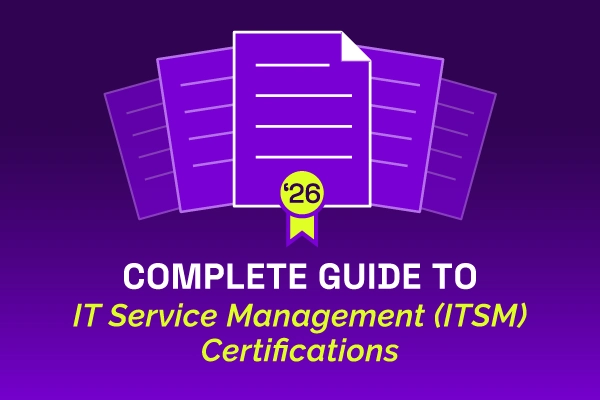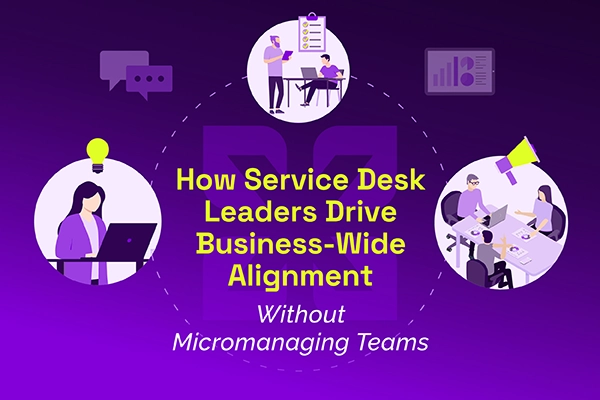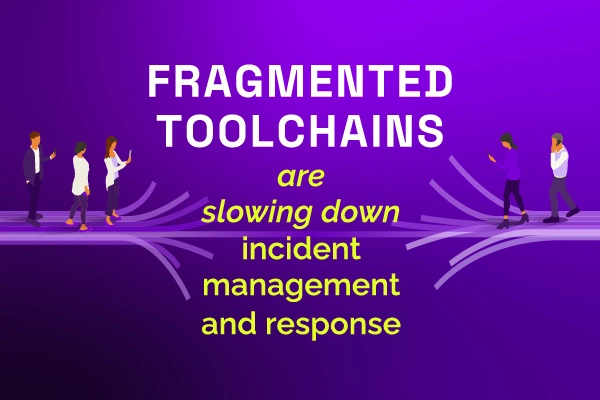
What is ServiceNow? The Best Alternatives in 2025
When it comes to IT Service Management (ITSM), ServiceNow is often the first name that comes up. It’s powerful, widely adopted, and packed with features. But the reality is that many IT leaders are actively looking for ServiceNow competitors due to its cost, complexity, and long implementation times. For some companies, ServiceNow has gradually become a burden that requires too much administrative oversight and is too difficult to keep updated—especially as business needs evolve. They are in search of a comprehensive solution that simplifies complex processes, integrates seamlessly with other tools, and enhances user autonomy.
If you’re an IT leader, CIO, CTO, or ITSM professional, we’ve written this blog for you. Unlike the typical listicles that just throw out a bunch of alternatives, we’ll take a deep dive into what really matters:
- Hidden costs and licensing traps
- AI-driven automation (who’s really leading?)
- Implementation speed (how soon can you actually go live?)
- Scalability & integrations (is it future-proof?)
- ServiceNow pricing breakdowns (with real numbers to help make informed decisions)
- The best ServiceNow alternatives in 2025
- Real-world case studies of companies switching from ServiceNow
Let’s get to it then.
Why Companies Are Moving Away from ServiceNow
1. The Cost Is Sky-High (With Hidden Fees)
ServiceNow pricing isn’t public, but it’s no secret that it’s expensive and unpredictable. Beyond initial quotes, companies face hidden fees such as:
- Mandatory add-ons for AI automation
- Minimum usage requirements (even if you don’t need that much!)
- Consulting and implementation fees that balloon over time, and additional costs for features that may not fully meet the project management needs of certain development teams.
For large enterprises, annual costs range from $100,000 to over $1,000,000, while mid-sized companies often start at $60,000 before add-ons. As of December 2024, ServiceNow reported nearly 500 customers with annual contracts exceeding $5 million—a 21% YoY growth in high-spend clients.
2. Implementation Takes Forever
A recurring complaint is that ServiceNow competitors offer faster implementation, while ServiceNow itself takes many months—sometimes years—to fully roll out. Competitors achieve this by automating workflows, which enhances operational efficiency and streamlines various processes within IT teams. With ServiceNow, IT leaders face delays due to:
- Complex configuration needs
- Lengthy approval cycles
- Heavy reliance on third-party consultants
While ServiceNow offers advanced AI tools, they’re often expensive add-ons, not core features. For example, enabling AI-driven workflows can double costs. In contrast, platforms like Xurrent include AI automation at no extra charge—driving efficiency without hidden fees.
4. Real-World Example: Why One Company Switched from ServiceNow
A leading UK-based insurance provider switched from ServiceNow to Xurrent after struggling with slow service delivery, rigid workflows, and expensive licensing. Within just 90 days, they replaced what took six years to build on ServiceNow. Post-switch, they reduced ITSM costs by 50% and achieved 70% self-service resolution through intelligent automation—transforming their service operations across IT, HR, and partner franchises to enhance service delivery.
What IT Leaders Are Looking For in ServiceNow Alternatives
Before we jump into the best ServiceNow competitors, here’s what really matters when choosing an ITSM solution (based on our numerous interactions with customers and IT professionals):
- Pricing & Licensing – Transparent costs with no surprise fees
- Implementation Time – How fast can you get up and running?
- AI & Automation – Built-in automation that actually works
- Scalability – Will it grow with your company?
- Security & Compliance – Meets ISO, SOC-2, and GDPR standards
- Customization & Integrations – Connects seamlessly with your existing stack (Teams, AWS, Power BI, etc.)
- Administrative Overhead – How many people does it take to keep things running? Many ServiceNow customers report high internal resourcing needs just to manage the platform.
- Collaboration Tools – Essential for enabling team members to effectively support each other during ticket resolution, thereby enhancing overall service delivery and efficiency.
- Upgrade Fragility – Frequent pain point: upgrades that break workflows or require reconfiguration, making agility harder than it should be.
Now, let’s look at the top ServiceNow alternatives in 2025.
Best ServiceNow Alternatives in 2025
1. Xurrent – The AI-Powered ITSM for Fast Implementation
Recommended for: Companies that want AI-driven automation, extensive enterprise service management capabilities, and fast setup without overpaying.
Xurrent is designed to solve one of the biggest ITSM pain points: slow, complex implementations. Unlike ServiceNow, which often requires months of configuration and external consultants, Xurrent offers a streamlined 5-week (on average) setup that ensures IT teams can be fully operational in a fraction of the time.
In addition, its AI-driven automation stands out. Xurrent integrates real AI automation, including auto-classification of tickets, sentiment analysis, and predictive recommendations, reducing IT workload significantly.
Key Features:
- AI-driven service desk (auto-classification, sentiment analysis, request summaries), incident management and resolution, knowledge management, and built-in ESM
- 5-week setup (compared to ServiceNow’s months-long rollout)
- Lower total cost of ownership – No hidden fees
- Enterprise-grade security (ISO-27001, SOC 2, C5, BYOK encryption)
- 33% of the cost of ServiceNow
Pricing: As low as $42 per agent per month.
Well-suited For: Mid-sized to large enterprises seeking fast, capable ITSM with low TCO.
2. Freshservice – The Budget-Friendly ITSM
Recommended for: Small businesses looking for an affordable and simple alternative to ServiceNow.
Freshservice is an excellent choice for companies that don’t need enterprise-level capabilities and are looking for an intuitive, budget-friendly ITSM solution. It is especially popular among SMBs that want to automate ticketing and service requests without requiring extensive setup.
One of its strongest advantages is its built-in AI-powered chatbot and automation rules, which allow IT teams to handle common issues automatically—saving both time and labor costs. While it lacks deep customization, it excels in ease of use, making it a good fit for teams who need quick deployment without a steep learning curve.
Key Features:
- AI-powered chatbot and automation rules
- Lower pricing than ServiceNow (but AI features require higher-tier plans)
- Easy to use, but lacks deep customization
Pricing: Starts at $19 per month for small teams. Higher-tier AI-powered plans go up to $100+ per month per agent.
Well-suited For: SMBs and growing companies with basic ITSM needs.
3. BMC Helix – The Legacy-Heavy Enterprise ITSM
Recommended for: Large enterprises that need an on-premise or hybrid alternative to ServiceNow.
BMC Helix is tailored for large enterprises that require deep customization, security, and high scalability. Unlike other ITSM tools that focus on cloud-based solutions, BMC Helix offers on-premise, hybrid, and cloud options, making it a versatile choice for enterprises with strict compliance requirements.
Its predictive analytics and AI-driven service management give IT teams an edge by identifying and resolving issues before they escalate. However, it requires a longer implementation period due to its high level of customization.
Key Features:
- AI-driven service management with predictive analytics
- Highly customizable, but longer implementation time
- Enterprise-level security and compliance
Pricing: BMC Helix ITSM does not publicly disclose its pricing, but it is known to be on the higher end of the ITSM market, particularly for mid-market and enterprise clients.
Well-suited For: Enterprises with extremely complex ITSM needs.
4. Jira Service Management – The Developers’ ITSM Solution
Recommended for: Organizations seeking a developer-friendly, flexible ITSM platform that integrates seamlessly with agile and DevOps practices.
Jira Service Management (JSM), developed by Atlassian, is designed to bridge the gap between IT operations and development teams. Leveraging its strong integration with Jira Software, JSM enables collaborative incident, problem, change, and task management, fostering a culture of continuous improvement.
Key Features:
- Seamless Integration with Jira – Ensures cohesive workflows between development and IT operations.
- Customizable Workflows – Adapt processes to fit organizational requirements without complex configurations.
- Real-Time Incident Management – Facilitates swift responses to incidents with clear tracking and communication.
- Self-Service Portal – Empowers users to resolve common issues independently, reducing the burden on IT staff.
Pricing: Starts at $19 per agent per month for the Standard plan, with Premium and Enterprise options offering additional features and much higher costs.
Well-suited For: Tech teams prioritizing collaboration over enterprise-scale ITSM.
5. Ivanti Neurons – “The Hyperautomation Platform for Self-Healing IT”
Recommended for: Organizations seeking proactive IT management, automation-driven security, and unified service experiences across distributed environments.
Ivanti Neurons is a cloud-based automation platform that leverages AI and automation bots to autonomously manage, secure, and optimize IT assets. It enables self-healing devices, reduces manual workloads, and delivers seamless support for modern workforces with a user-friendly interface.
Key Features:
- Self-Healing Automation: Bots auto-remediate configuration, performance, and security issues before users notice.
- Edge Intelligence: Real-time device insights via natural language queries and sensor-based architecture.
- Unified Experience: Single interface for IT, security, and end-user operations with actionable analytics.
- Asset Management: Real-time discovery and lifecycle tracking for hardware/software.
- Role-Based Security: SSO, MFA, and granular privilege management.
- Self-Service Portal: User-driven issue resolution to reduce IT workload.
- Advanced Analytics: Curated dashboards for compliance and decision-making.
Pricing: Available upon request (custom plans based on scale).
Well-suited For: Enterprises, government, healthcare, and education sectors with complex IT environments needing automated workflows and secure, scalable solutions.
TL;DR
Finding the right ServiceNow alternative depends on your organization’s size, budget, and specific ITSM needs. If you require fast AI-driven automation that provides most of the functionality of ServiceNow at a fraction of the cost, Xurrent is an excellent choice. If cost is a concern and your needs are basic, Freshservice provides a budget-friendly solution. Large enterprises that need extensive customization and scalability may find BMC Helix the best fit. Jira Service Management fits Dev-centric teams, while Ivanti Neurons is an option for businesses focusing on complex use cases.
Ultimately, selecting the right ITSM solution is about balancing features, cost, and implementation speed. Take advantage of free trials and demos to determine which platform aligns best with your business needs. If you’re looking for a powerful, AI-driven ITSM solution with fast setup, consider Xurrent—sign up for a free demo today and see for yourself.
.png)
ServiceNow Pricing: Is It Worth the Premium in 2026?
In 2026, is the "platform of platforms" becoming a budget black hole? This article pulls back the curtain on the opaque "custom quote" maze, exposing the hidden implementation multipliers and licensing complexities that inflate ServiceNow’s Total Cost of Ownership. Discover why IT leaders are switching to Xurrent to cut costs by up to 75% while modernizing their service operations with a unified, transparent alternative.

Xurrent named a Market Leader in Research In Action’s Vendor Selection Matrix™ for IT & Enterprise Service Management Solutions
Xurrent earns #1 rankings in customer satisfaction, price vs value, and recommendation index in Research In Action's global ITSM/ESM Vendor Selection Matrix report.




